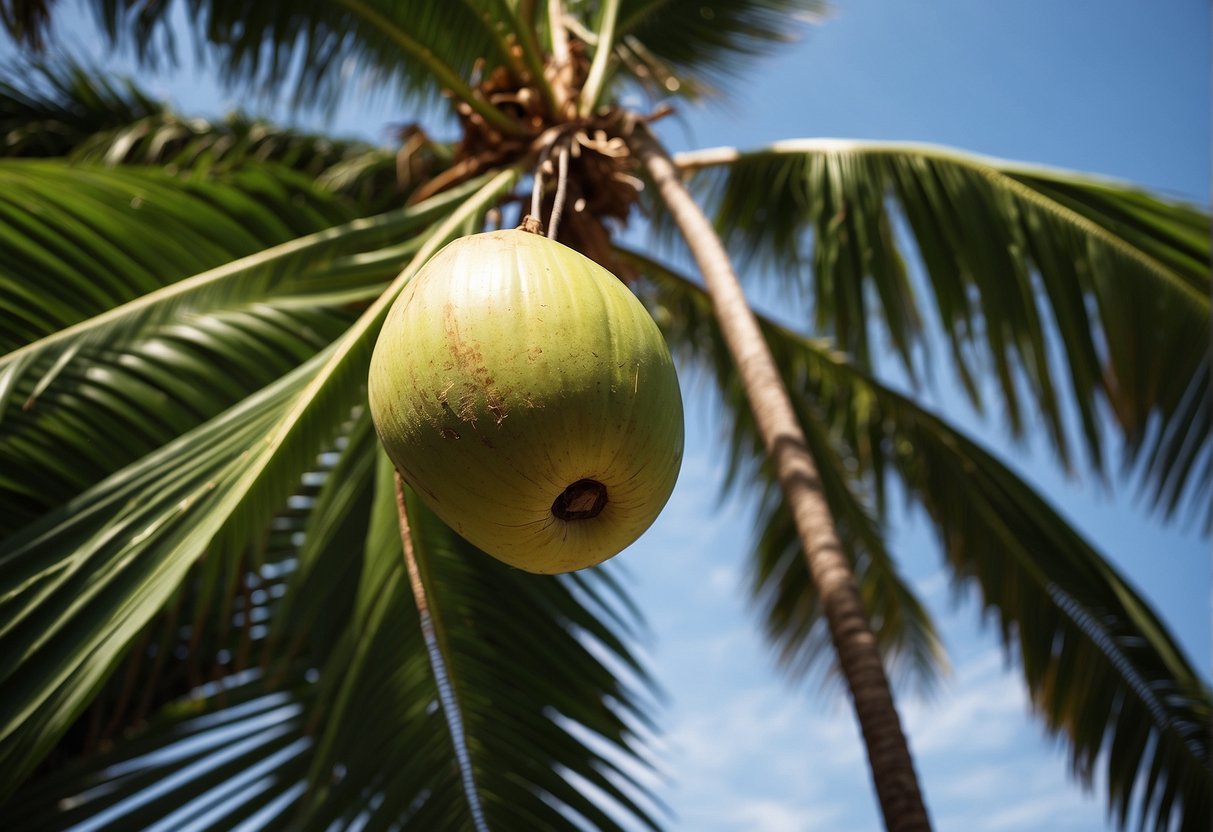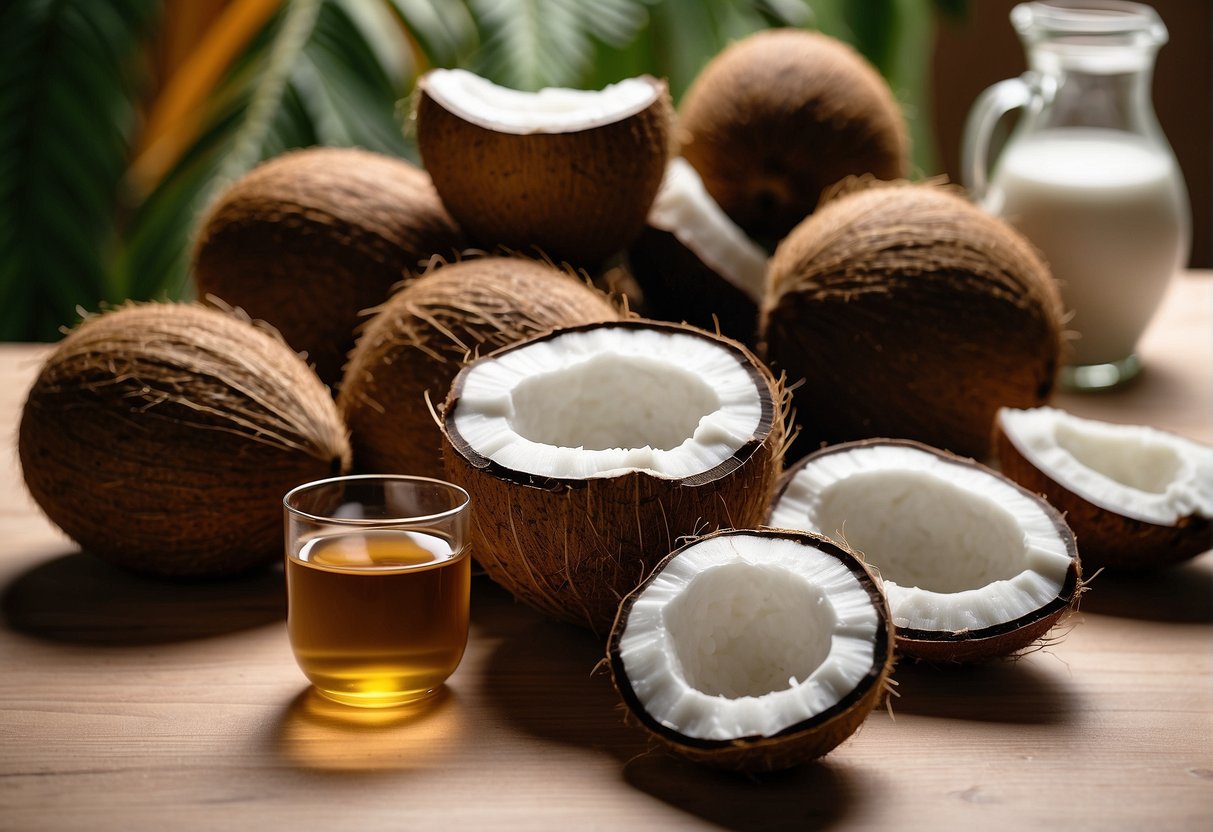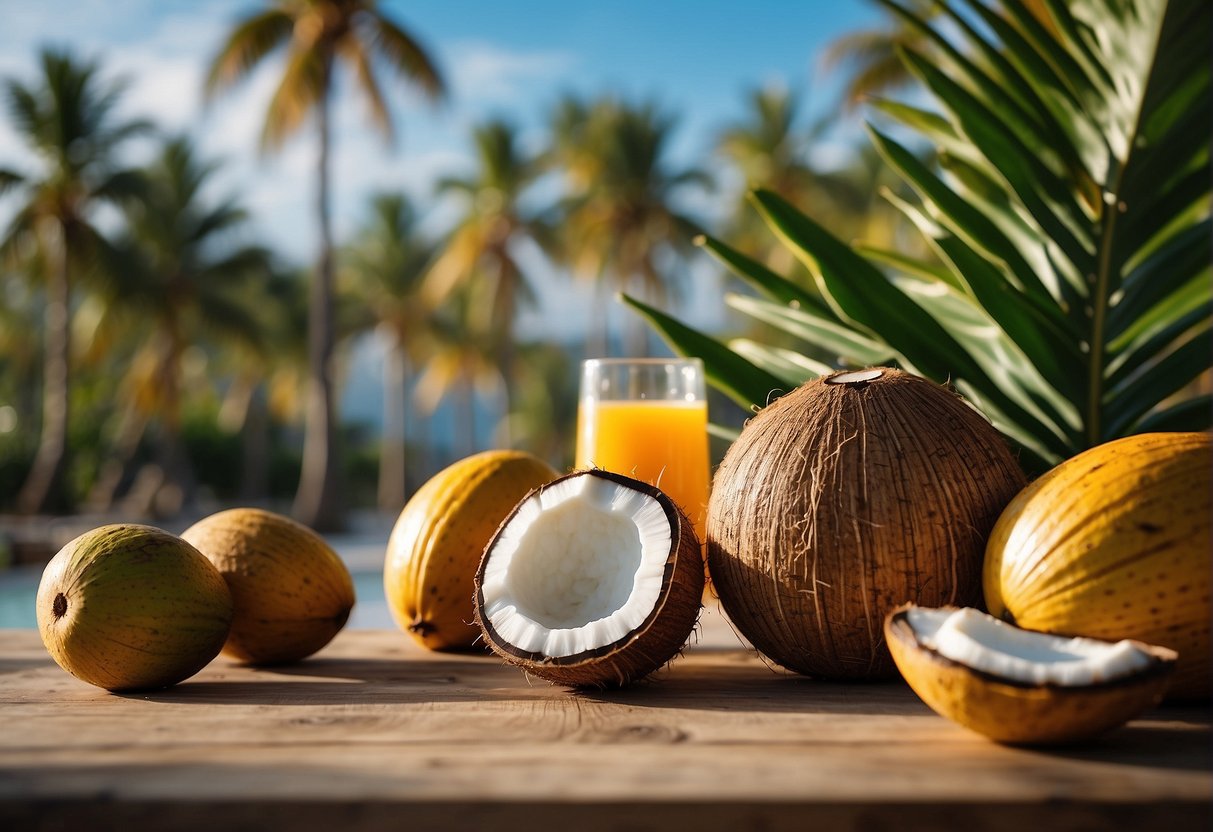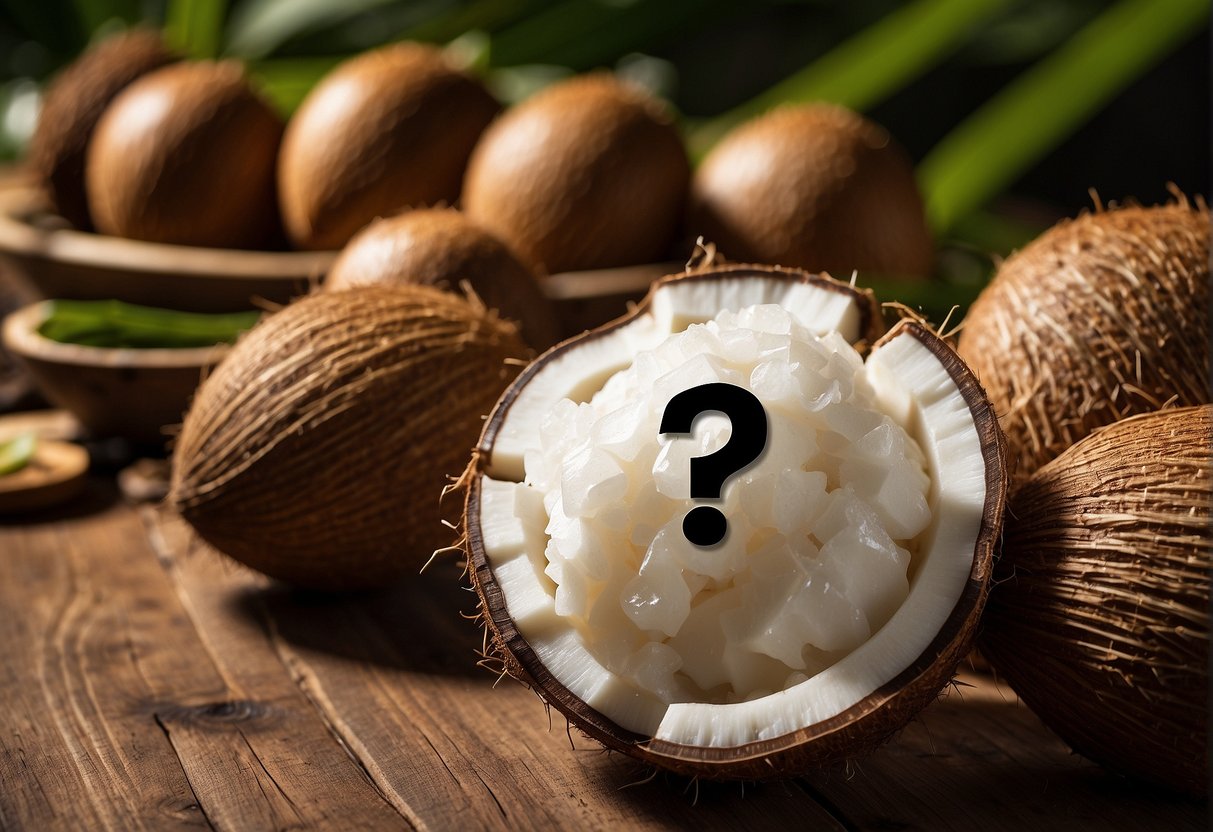Is Cocos Nucifera Vegan? Unveiling the Truth About Coconut Products
Coconuts, scientifically known as Cocos nucifera, are a staple in vegan diets, valued for their versatility and plant-based origin. As a product of the coconut palm, every part of the coconut is utilized, from its water and flesh to the oil and milk, making it an integral component in various vegan recipes and products. We understand their importance not just as a dairy alternative but also due to their role in a sustainable and environmentally friendly lifestyle.

Within vegan circles, the coconut's ability to replace many animal-derived ingredients is highly prized. It serves as a base for yogurts, cheeses, and even ice cream, all without compromising on taste or texture. Moreover, coconuts contribute to the sustainability aspect of veganism, as coconut palms can be an ecologically sound crop, absorbing carbon dioxide while providing valuable resources.
Key Takeaways
- Coconuts are utilized extensively in a vegan diet for their plant-based versatility.
- They replace animal-derived ingredients in many vegan products.
- Coconut cultivation can align with sustainable practices, benefiting the environment.
Cocos Nucifera Origins and Characteristics

In exploring the vegan nature of Cocos nucifera, commonly known as the coconut palm tree, we must start by understanding its origins and characteristics. Known for its versatility and economic importance, this tropical plant has a rich background worth examining.
Tropical Habitat and Diversity
Cocos nucifera thrives in the humid, warm climates of tropical regions around the globe. As a native entity of these areas, it contributes significantly to the ecological diversity. We find coconut palm trees lined along coastal landscapes, forming an integral part of local ecosystems due to their ability to adapt to sandy soils and resist salt spray.
Botanical Profile
The coconut palm tree, a member of the Arecaceae family, exhibits a distinctive botanical profile with its long, pinnate leaves that can extend up to 6 meters in length. Atop a tall, slender trunk, these leaves fan out, providing a characteristic silhouette against tropical skies. The tree yields the coconut, which is not only a staple food but also a source of various products, confirming the plant's stature as a versatile and precious resource in tropical horticulture.
Nutritional Composition of Coconut Products

In our exploration of coconut products, we focus on the rich nutritional profile they offer. From coconut oil to coconut water, these products feature a diverse range of beneficial components, suitable for both culinary and cosmetic uses.
Healthful Components
Coconuts (Cocos nucifera) encapsulate a wealth of nutrients, important for a balanced diet. Our analysis reveals that coconut oil is rich in medium-chain triglycerides (MCTs), which are fatty acids that the body metabolizes more efficiently than long-chain triglycerides, leading to a variety of health benefits. Particularly, lauric acid, which constitutes about 50% of coconut oil's fatty acids, can boost the immune system and has antimicrobial properties. Coconut products are also a good source of vitamins and antioxidants, which help in combating oxidative stress in the body.
Coconut milk and coconut water offer a lighter alternative to coconut oil, with coconut water being a hydrating beverage high in electrolytes and coconut milk containing lower levels of MCTs. Both of these are rich in nutrients and provide a hydrating effect which is especially beneficial in dietary practices.
Culinary and Cosmetic Uses
In culinary applications, coconut products provide not only nutritional benefits but also versatility in use. Coconut milk serves as a creamy, plant-based substitute in numerous recipes, ranging from curries to dairy-free yogurts. It carries a significant nutritional punch, being a good source of essential minerals and providing a rich, smooth texture to vegan dishes.
When it comes to cosmetic applications, coconut oil is celebrated for its moisturizing properties, owing to its fatty acid composition. It is commonly integrated into skin care routines to promote hydration and as a natural remedy for specific skin conditions. The edible qualities of coconut oil also lend to its use in homemade beauty products, ensuring a pure, chemical-free formulation for nourishing the skin.
Health and Wellness Benefits

We explore the profound health benefits of Cocos nucifera, commonly known as coconut, which is a staple in vegan diets due to its versatile, plant-based origins. The therapeutic and dietary advantages of coconuts contribute significantly to various health and wellness aspects.
Therapeutic Properties
Coconuts possess a range of therapeutic properties that are beneficial for our health. They are known for their moisturizing effects, crucial for skin health, due to their high medium-chain fatty acids content. These properties can aid in reducing dryness and improving skin barrier function. Furthermore, the anti-inflammatory and antimicrobial qualities of coconut products can support the immune system by fighting off infections and reducing inflammation throughout the body.
Dietary Advantages
Incorporating coconuts into our diet offers several advantages. As a plant-based source of nutrients, they are rich in minerals and healthy fats that are essential for brain function and heart health. Coconuts are also valued in weight management; their high fiber content and medium-chain triglycerides can help in feeling full and promote fat burning. In the context of a vegan diet, coconuts provide a versatile and nutritious option that supports overall health and wellness.
Cocos Nucifera in Vegan Lifestyle

Cocos Nucifera, commonly known as coconut, plays a significant role in vegan diets by providing a versatile, nutritious, and sustainable substitute for animal products. Our discussion will explore its plant-based applications and the ethical and environmental impact of incorporating coconut into a vegan lifestyle.
Plant-Based Utility
Coconuts serve as a cornerstone in vegan nutrition due to their ability to be transformed into a myriad of plant-based products. We find that coconut milk is a popular lactose-free alternative to dairy milk, making it suitable for vegans and individuals with lactose intolerance. Additionally, the versatility of coconut allows for the creation of coconut yogurt using vegan starter cultures and for the production of coconut flour and virgin coconut oil, which are essential in vegan baking and cooking. These non-dairy products provide a healthier alternative with minimal processing involved, aligning with the health-conscious aspects of a vegan diet.
Ethical and Environmental Considerations
From an ethical perspective, coconuts are a non-controversial choice within veganism as their harvesting does not involve animal exploitation or suffering. In environmental terms, coconut palms are a sustainable and renewable resource, playing a vital role in sustaining ecosystems. Their widespread cultivation can be managed in a way that supports biodiversity and soil health. Furthermore, coconuts require relatively less water compared to animal farming, making them a more environmentally friendly option. Our inclusion of coconuts in our vegan lifestyle supports a commitment to sustainability and respect for the environment, while also providing a bounty of resources that enrich our diets without harming the planet.
Cultivation and Environmental Impact

In our analysis of coconut palm cultivation and its environmental footprint, we focus on agricultural methods and the potential for sustainable harvesting. Our insights are grounded in research specific to regions where the coconut palm is a significant crop, such as India, Hawaii, and countries in Africa including Ghana, Mozambique, Nigeria, and Tanzania.
Agricultural Practices
Coconut palms (Cocos nucifera) are grown predominantly in tropical regions and require specific agronomic conditions for optimal growth. In India and other traditional cultivating regions, we observe a mix of both conventional and organic farming practices. Conventional methods may involve the use of synthetic fertilizers and pesticides, which can have environmental implications, while organic practices, which avoid synthetic inputs, aim to minimize the ecological footprint.
| Sustainable Asia | Sustainable Africa | Sustainable Americas |
|---|---|---|
| India - Organic emphasis | Tanzania - Mixed approaches | Hawaii - Renewable resource integration |
| Sri Lanka - Biodiversity conservation | Ghana - Smallholder farms | Florida - Ecosystem management |
When cultivating in regions such as Hawaii and Florida, there is an increasing effort to integrate coconut palm within sustainable systems that consider it as a renewable resource, potentially contributing to both ecological benefits and local economies.
Sustainable Harvesting
In sustainability terms, our examination reveals a growing trend in the harvesting of coconut palms that aims to minimize environmental impact. In countries like Mozambique and Nigeria, we find approaches that span from manual, labor-intensive methods to more mechanized, albeit eco-conscious, methods. These practices strive to ensure a balance between meeting the demand for coconut products and maintaining the health of ecosystems.
- Renewable Harvesting Techniques: These include methods that ensure the longevity and health of the coconut palm, as well as the soil it grows in.
Highlight on Renewable Techniques
- Mozambique/Nigeria: Use of manual tools to prevent damage
- Economic Considerations: Balancing harvest with market needs
By focusing on renewable resources and emphasizing responsible agricultural practices, regions are adapting to produce in harmony with their environment. Sustainability is a core component of our practices, ensuring that the environment is respected while providing for current and future demands.
Frequently Asked Questions

In our discussion regarding "Cocos nucifera," commonly known as coconut, we focus on its compatibility with veganism and explore various coconut-based products suitable for a vegan diet.
Can coconut-based products be included in a vegan diet?
Yes, coconut-based products can be included in a vegan diet. These products are plant-based and do not contain any animal-derived ingredients.
Are all forms of coconut milk suitable for those following a dairy-free lifestyle?
All forms of coconut milk are inherently dairy-free and are suitable for vegans. However, it's important for those on a dairy-free lifestyle to check for additional ingredients that may not be vegan.
Does coconut cream contain any animal-derived ingredients?
Coconut cream is made from the high-fat content of coconut milk and does not contain any animal-derived ingredients, making it vegan.
What are some vegan alternatives to traditional dairy products?
Vegan alternatives to dairy products include foods made from coconuts, such as coconut milk, cream, and yogurt. Other alternatives also encompass almond, soy, rice, and oat-based products.
How can I identify vegan-friendly sweeteners in my diet?
To identify vegan-friendly sweeteners, look for plant-based options like stevia, agave nectar, or maple syrup. Always check the label to ensure that the sweeteners do not contain animal-derived processing agents.
What ingredients should vegans look out for to maintain a plant-based diet?
Vegans should avoid honey, gelatin, and certain E-numbers derived from animals. It's essential to read labels and be aware of less obvious non-vegan ingredients such as casein, whey, and some forms of vitamin D3.